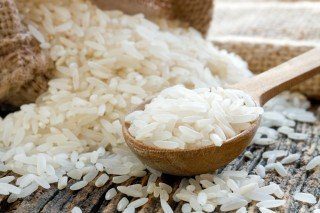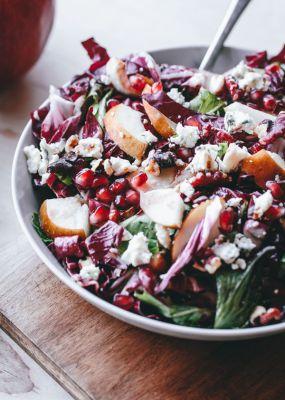Our diet affects our energy levels with the wrong type of foods being draining and leaving us feeling lethargic and lazy. As your energy levels drop, you’ll likely grab a meal or a quick snack to give yourself a boost. Unfortunately, choosing the wrong foods could leave you void of energy and have you feeling tired and lazy.
If you experience that your lethargic state has little to do with lack of sleep and more to do with diet choices, read on to find out which foods you should be cutting out.
Foods That Drain Your Energy
1. Refined grains
Grains are filled with carbohydrates that provide the body with energy. Unfortunately processed grains – which include white bread, white rice, and white pasta – can actually deplete energy levels. As opposed to whole grains, these types of grains contain lower levels of fibre which means they’re quickly digested and absorbed and this is why they’re high on the glycemic index.

Evan Lorne/Shutterstock
Being high glycemic foods, once they’ve quickly entered the bloodstream, they cause a drastic rise in blood sugar levels which provides you with a burst of energy. Unfortunately, the blood sugar soon quickly crashes, leaving you feeling sluggish. These types of foods can also contribute to weight gain. As opposed to refined foods, whole grains such as brown rice and whole-wheat pasta are full of fibre which helps with digestion, and they contain other nutrients that can help balance out blood sugar levels.
2. Sugary Breakfasts
Breakfast is the most important meal of the day and a good breakfast can help start your day with good energy. While some breakfast meals promise to do this, in reality, they do the complete opposite. Cereals are likely the staple breakfasts for many households, but that may need to change.
Some of these cereals are lacking in essential nutrients like fibre and are full of high-fructose corn syrup and added sugars. As these cereals are high in sugar and low in fibre, they increase blood sugar levels which will eventually lead to an energy crash. Other sugary breakfasts to avoid include muffins, most orange juices, and some yoghurt that claim to be fat-free. As you’re eating these types of breakfasts every day, research suggests that in doing so- you’ll begin to increasingly crave other sugary foods and this creates a downward spiral of your health and general well-being.
For the right type of breakfast, opt for wholegrain cereals.
3. Alcohol
It’s common to have a glass of wine with your dinner -and maybe your lunch if you’re having a really good day- but this behavior could seriously disrupt your sleep cycle. During a night of binge-drinking, alcohol affects the central nervous system, thereby slowing it down. When this happens, your brain is unable to properly regulate the body, which can leave you feeling exhausted – and possibly dehydrated – the next morning.

Olena Yakobchuk/Shutterstock
Some believe that a glass of wine or their favorite alcoholic beverage before bed helps them fall asleep. Although true, the amount of alcohol consumed can affect the quality and duration of sleep. If consumed in large amounts – you are likely to wake up the next morning less rested and relaxed than intended. Also, according to a study published in the Journal of Food Composition and Analysis, red wine is extremely high in melatonin – the natural sleep cycle – so one glass can leave you feeling sleepy. Hence, to ensure that your favorite bottle doesn’t put you to sleep, be conscious of your consumption levels. Dietary guidelines suggest that that woman should limit
their intake to one drink per day whilst men can enjoy up to two drinks per day.
4. Coffee
Although coffee is seen as a great energy boost, relying on caffeine to keep you refreshed is never the best idea. With the instant energy boost it provides, you are likely to suffer an energy crash after drinking too much coffee. However, your love for coffee can also cause you to become addicted. This can leave you feeling tired and cranky whenever a cup isn’t in your hand.
According to a study published in the Advances in Psychiatric Treatment, high levels of caffeine can affect sleep quality. This can cause harm to both your health and general well-being in the long run. If your bond is too strong with either Starbucks or the office espresso machine, dietary guidelines suggest that you limit your coffee intake to around four cups per day. With the right nutrients, our bodies can regulate our energy levels but when we feed it with caffeinated energy – like coffee, energy drinks, and even sodas- we are likely to feel depleted. Click here to find out more about nutrition and why it is essential to every part of our lives.
5. Fast Foods
The term itis (officially known as postprandial somnolence) connotes a lethargic feeling after consuming a heavy meal. Although mostly synonymous with Thanksgiving and Christmas dinners, this term actually has some truth to it. Fast and greasy foods like fries, hamburgers, red meats, and even doughnuts are difficult for the body to digest. This is due to their high fat and low fibre content. The body works even harder to digest these types of foods, using all its energy.
According to a 2015 study, with this type of slow digestion, there will be little energy left for you to feel refreshed in the manner you expected to feel after a meal. Once you’ve eliminated or moderated these types of foods in your diet, you can replace them with energy-boosting foods like almonds.





![women [longevity live]](https://longevitylive.com/wp-content/uploads/2020/01/photo-of-women-walking-down-the-street-1116984-100x100.jpg)









